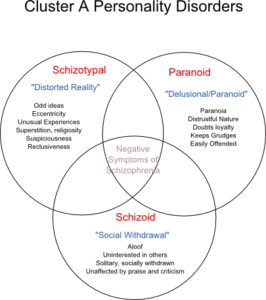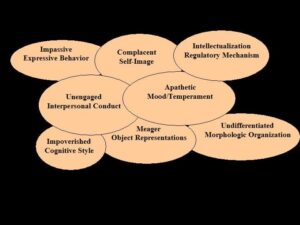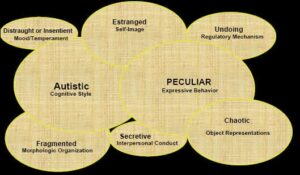Introduction – Personality Disorders Part 2
First of all, what do you really know about paranoid and other personality disorders? Maybe you are reading this because you may be wondering if these disorders are applicable to someone you know. Another good read would be to gain perspective on your own habit. Whereas it’s important to get friends and family to help if needed, resist the urge to practice armchair psychology. Although the idea of a personality disorder is something that may lead to playful banter, these issues can be quite serious.
In this post, we discuss the group of disorders that involves especially odd thinking or behavior. As a group, these are known as Cluster A personality disorders. Although there are three disorders in this group (paranoid, schizoid and schizotypal), we’ll focus on paranoid personality disorder.
Another important consideration is that those with personality disorders do not necessarily have psychosis. As is the case with all personality disorders, a single cause is unknown. There is a mix of genetic predisposition and environmental triggers that appear to play roles.
Paranoid Personality Disorder
Individuals with paranoid personality disorder (PPD) have a long history of distrust and suspicion. Consequently, this often leads to social isolation and poor functioning. Even more, PPD often results in compromised school, work and personal relationships. It is more common in men and families with psychotic disorders.
Symptoms may include the following:
- Constant feeling of being in danger
- Unjustified belief that others have hidden motives and are trying to harm, deceive or exploit
- Unjustified suspicion of the loyalty or trustworthiness of others
- Hesitance to confide in others due to unreasonable fear that others will use the information against you
- Perception of innocent remarks or unthreatening situations as personal insults or attacks
- Angry or hostile reaction to perceived slights or insults, with a tendency to hold grudges
- Unjustified, recurrent suspicion that spouse or sexual partner is unfaithful
- Inability to work together with others
- Detachment and social isolation
- Lack of insight that feelings are unjustified
Furthermore, treatment is difficult because people with this condition are often very suspicious of doctors. Fortunately, medications and behavioral (talk) therapy can often be effective. This type of therapy is effective at reducing paranoia and limiting the impact on the person’s daily functioning.
The other two disorders in Cluster A are schizoid and schizotypal personality disorders. Causes and treatments are similar to those in PPD, but here are some of the defining symptoms of each.
Schizoid Personality Disorder
Think of an excessively flat personality
- Appearance of indifference to others
- Inability to take pleasure in activities or accomplishments
- Inability to pick up on social cues
- Little emotional expression
- Little interest in sex or interpersonal relationships
Schizotypal Personality Disorder
Think of abnormal thoughts and activities
- Belief that incidents or events have hidden messages meant specifically for you
- Belief that you can influence people and events with your thoughts (aka magical thinking)
- Inappropriately indifferent responses to others
- Inappropriate or flat emotions
- Lack of comfort with close relationships, even with family
- Odd perceptual experiences, such as hearing a voice say your name
- Social anxiety
Above all, it’s not enough to have some symptoms. A level of social dysfunction is necessary to establish a diagnosis.
Click here for an introduction to personality disorders.
Follow us!
Ask your SMA expert consultant any questions you may have on this topic. Also, take the #72HoursChallenge, and join the community. Additionally, as a thank you, we’re offering you a complimentary 30-day membership at www.72hourslife.com. Just use the code #NoChaser, and yes, it’s ok if you share!
Order your copy of Dr. Sterling’s books There are 72 Hours in a Day: Using Efficiency to Better Enjoy Every Part of Your Life and The 72 Hours in a Day Workbook: The Journey to The 72 Hours Life in 72 Days at Amazon or at www.jeffreysterlingbooks.com. Another free benefit to our readers is introductory pricing with multiple orders and bundles!
Thanks for liking and following Straight, No Chaser! This public service provides a sample of http://www.SterlingMedicalAdvice.com (SMA) and 844-SMA-TALK. Likewise, please share our page with your friends on WordPress! Also like us on Facebook @ SterlingMedicalAdvice.com! Follow us on Twitter at @asksterlingmd.
Copyright © 2018 · Sterling Initiatives, LLC · Powered by WordPress





